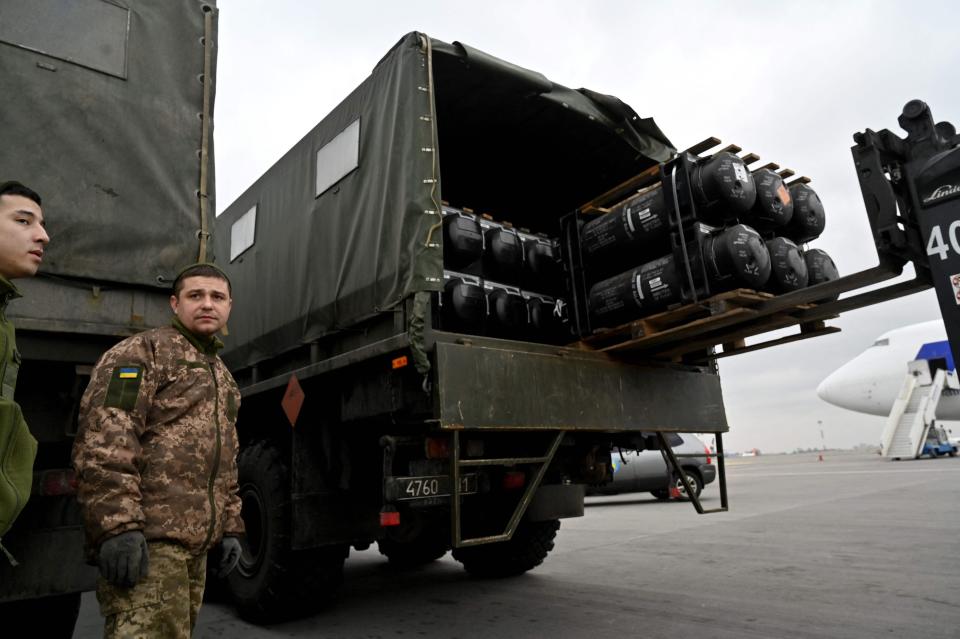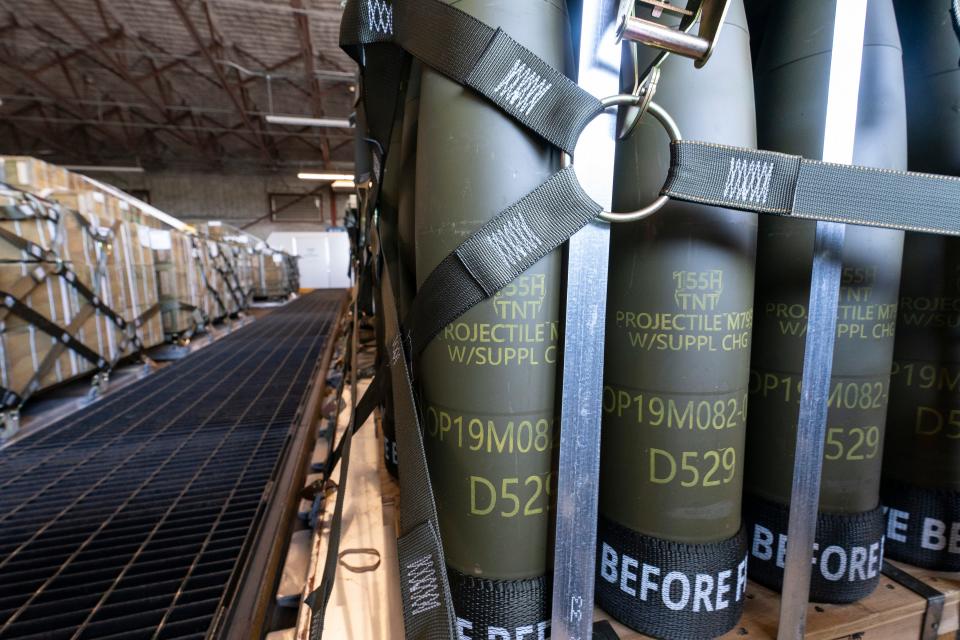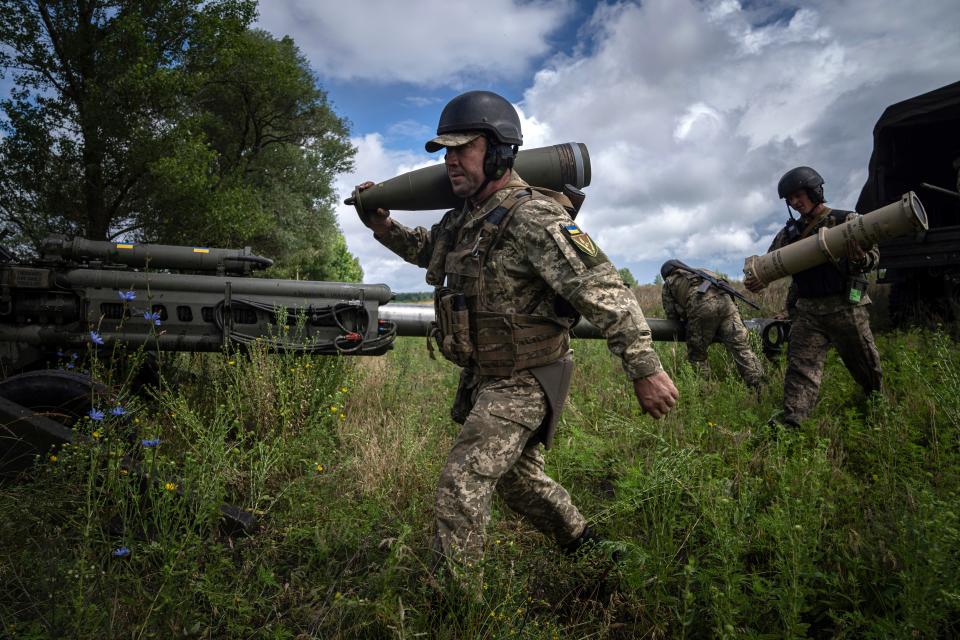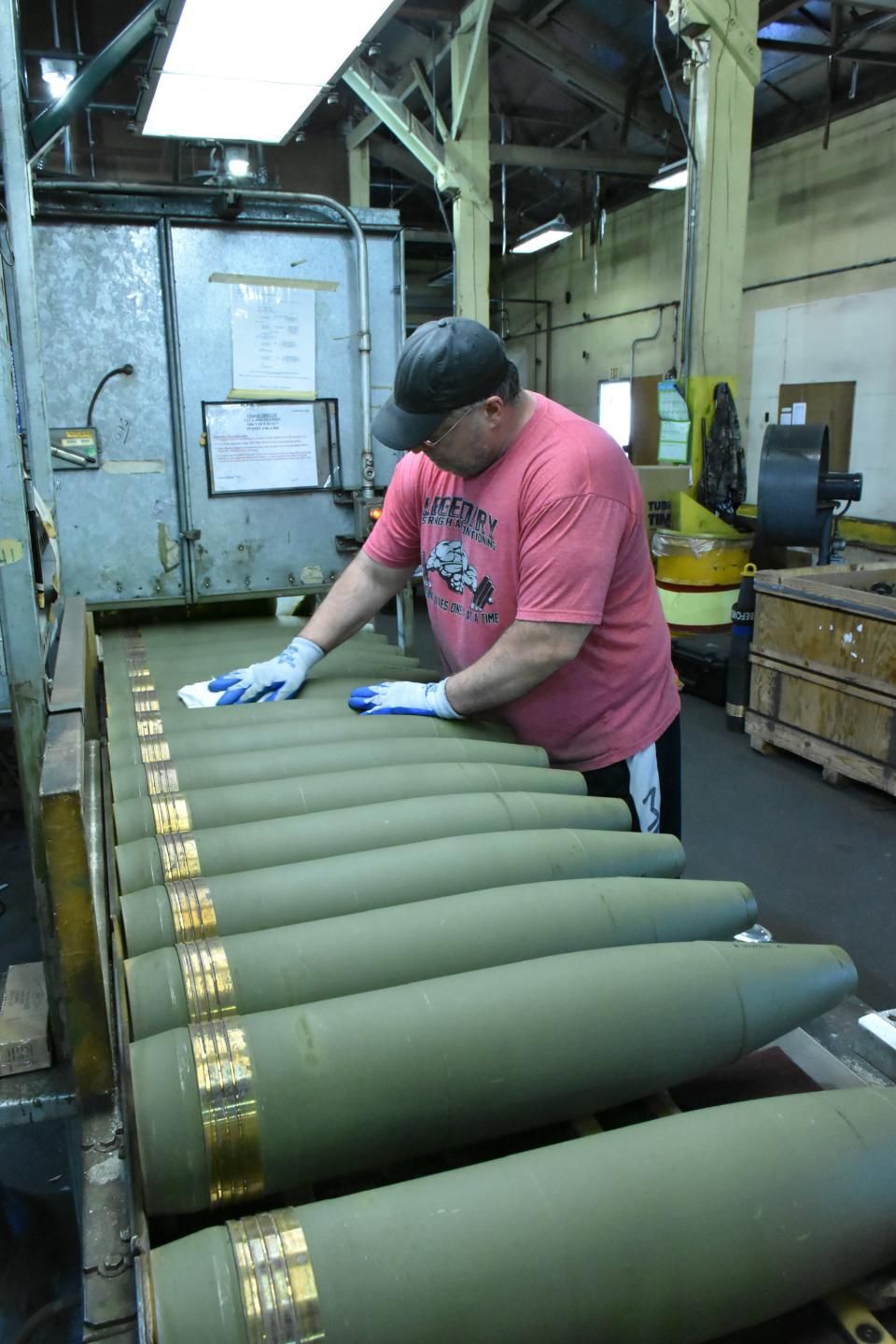Made in USA: How Biden is trying to sell Israel and Ukraine military aid to Congress
- Oops!Something went wrong.Please try again later.
WASHINGTON – Thanks to the insatiable need for U.S. artillery overseas, an ammunition plant in southeast Iowa that first churned out bombs and other munitions for World War II is getting an approximately $1.5 billion upgrade.
Communities within a 50-mile radius of the tiny community of Middletown where the sprawling plant sits among cropland and wooded hills are expected to be involved.
"We know that something big is coming," said Della Schmidt, president and CEO of the Greater Burlington Partnership, the economic development and Chamber of Commerce entity for the region. “We’re getting ready.”
As President Joe Biden pushes Congress for tens of billions of dollars in additional military support for Ukraine and for Israel, he has emphasized that the missiles and artillery shells being sent overseas are made in America, providing a local economic boost.
“And let me be clear about something: We send Ukraine equipment sitting in our stockpiles. And when we use the money allocated by Congress, we use it to replenish our own stores − our own stockpiles with new equipment − equipment that defends America and is made in America,” Biden said in a rare prime-time address this month in which he noted artillery shells are made in a dozen states across the country.
But that may not be a winning argument for the significant number of Republican lawmakers opposed to spending more money on Ukraine.
“We are $33 TRILLION in debt, and Ukraine is not the 51st state,” Rep. Barry Moore, R-Ala., posted on the platform X, formerly Twitter, in September. "America First."
Biden visited Moore’s district last year and toured a Lockheed Martin facility that makes the anti-tank Javelin missiles that have become an iconic weapon of Ukraine’s fight against Russia’s invasion.
They’ve been so important to the war, the president noted, that some Ukrainians have named their children "Javelin" or "Javelina."
They also have helped employ the 265 Alabamans working on the missiles at the Troy plant, Biden said, because "being the arsenal of democracy also means good-paying jobs for American workers in Alabama and the states all across America where defense equipment is manufactured and assembled."

Some lawmakers oppose continued aid for Ukraine
Still, Moore was among the 93 House Republicans who voted in September for an amendment to prohibit all military assistance to Ukraine. It was unsuccessful
Other opponents include Arkansas Rep. Bruce Westerman, whose district includes defense-heavy Camden, where Aerojet Rocketdyne and General Dynamics are expanding and Lockheed Martin is hiring more assemblers, engineers and others for the rocket systems and other weapons it makes.
General Dynamics also is building a new plant to produce artillery projectile metal parts in Mesquite, Texas, a city near Dallas represented by Rep. Lance Gooden, who has voted against more aid to Ukraine. Newly elected House Speaker Mike Johnson, R-La., has likewise opposed continued aid for Ukraine, though he has said recently that he could support more aid under certain conditions.
At a meeting at the White House last week, Johnson said, he delivered a dozen "critical questions" House Republicans want answered, including about the administration’s "endgame in Ukraine."
"We're not going to abandon them," Johnson told Fox News’ Sean Hannity. "But we have a responsibility, a stewardship responsibility over the precious treasure of the American people. And we have to make sure that the White House is providing the people with some accountability for the dollars."

Economic impact on U.S. communities
The U.S. has already committed about $44 billion in military aid to Ukraine, which is about 12% of defense procurement since the support began, according to Mark Cancian, a former White House weapons strategist who is now a senior adviser at the Center for Strategic and International Studies.
"That’s a substantial bump up," Cancian said. The money, though, will be spent over multiple years, so it’s not enough to transform the entire defense industry, he said. It will, however, have significant effects on some communities.
General Dynamics’ new plant in Mesquite could infuse more than $500,000 in new property tax revenue to the city each year, according to the city’s economic development director. The estimated 125 new General Dynamics jobs will expand work opportunities beyond the many restaurant and retail jobs in the suburban community whose mall is one of the largest retail destinations in the Dallas-Fort Worth area.
"We want our residents to not only be able to shop and eat here but also to not have to leave home to find employment," said Whitney Golin, the city’s director of communications and marketing.
The artillery casings plant is part of the Defense Department’s effort to increase artillery production sixfold in less than three years. The Army has said the billions of dollars it plans to spend on munitions plants represents its biggest transformation in 40 years.
"It’s been a sea change in how the Department of Defense has been thinking about this," said Byron Callan, a defense analyst at Capital Alpha Partners LLC.

'It’s important to us on an emotional level'
When Russia invaded Ukraine in February 2022, there was not a lot of spare capacity in the defense industrial base. Ukraine’s needs also got the Pentagon thinking about what would be required if China tries to take over Taiwan, Callan said.
"It’s part of industry that (has) atrophied," he said.
As a result, the Scranton Army Ammunition Plant, one of two sites in the U.S. that make the steel bodies for 155 mm artillery shells being sent to both Ukraine and Israel, is getting a $243 million upgrade to ramp up production.
"It’s a big deal," said Bob Durkin, president and CEO of the Greater Scranton Chamber of Commerce. Through multiplier effects, Durkin estimates that could translate into a $600 million infusion for the regional economy.
The historic factory, a monstrous operation on the edge of downtown Scranton, has become a new source of pride for the community, which has five Ukrainian churches serving a significant diaspora.
"It’s important to us on an emotional level," said Scranton Mayor Paige Cognetti. "In terms of the economics, anytime you have any sort of manufacturing that’s been around for many decades, you want to see that continued investment, especially as over the decades we’ve seen different companies offshore their work."
The shells made in Scranton are shipped to the Iowa Army Ammunition Plant in Middleton, where they are loaded with explosives and packed for final delivery. There’s great anticipation in southeast Iowa for what’s coming, even if there are still a lot of unanswered questions, said Schmidt of the Greater Burlington Partnership.
"Everybody in town wants to know: 'When are we going to start feeling this? When are we going to start seeing people around? When are we going to see the big ramp-up? How long will this last?'" she said.

Challenges ahead
At a meeting last week, the dozens of business leaders, mayors, city managers and other local officials from the region eager to learn more heard from the Army that the influx of construction workers will start later than they had expected. The budget impasse in Congress that has delayed the completion of the 2024 budget means it could be a year before there’s an increase in out-of-town workers. The larger effects won’t be felt until 2005 and 2006.
"In many ways, this was welcome news," Schmidt said, "because it means our community has even more time to get out in front of and work on issues like housing and transportation."
Local officials are forming a housing committee to address the short-term needs of the many temporary workers coming to build out the facility and the permanent housing required for the smaller number of new plant workers. Officials are hoping to encourage a hub and spoke system for getting construction workers to the site and must examine whether the county roads can meet the higher traffic demands.
Schmidt said they need to focus on workforce development to help fill the new jobs at the plant, which is already a major employer in the area, though with far fewer workers than it had during its World War II peak.
And it’s important to manage expectations, she said, so local businesses understand that the initial burst of new customers for restaurants, hotels, grocery stores, bars and other service providers won’t be sustained at that level after construction ends.
Ticking through all the challenges ahead, Schmidt is quick to add that it is an “excellent problem to have.”
"We’re looking forward to welcoming these workers," she said. "We want these folks to know that we’re excited they’re here."
This article originally appeared on USA TODAY: Weapons for Ukraine, Israel are made in US, boosting local economies

